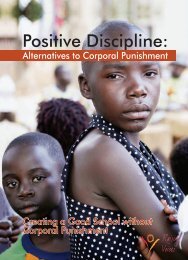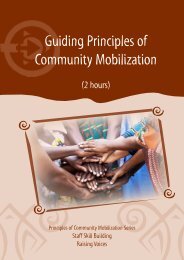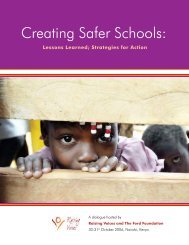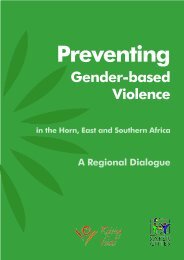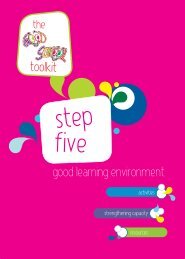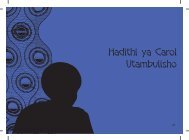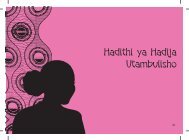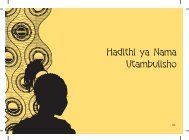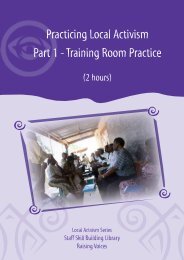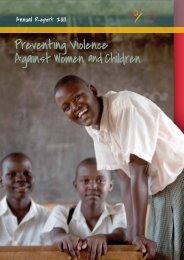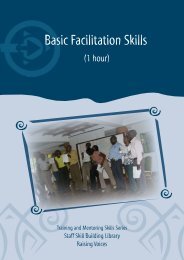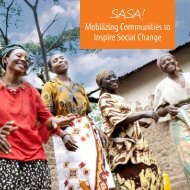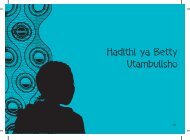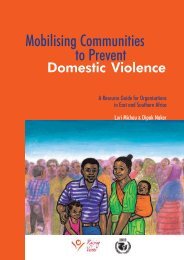Violence against children, the voices of Ugandan ... - Raising Voices
Violence against children, the voices of Ugandan ... - Raising Voices
Violence against children, the voices of Ugandan ... - Raising Voices
Create successful ePaper yourself
Turn your PDF publications into a flip-book with our unique Google optimized e-Paper software.
Adults’ <strong>Voices</strong>Key Informant InterviewFemale Community LeaderQ: What is commonly done when people punish<strong>children</strong> in your community?A: Beating is commonly used, glaring, quarrellingwith <strong>children</strong>, shouting, insulting, neglecting,refusing to take <strong>children</strong> to school even whenparents are able.Q: Are many <strong>children</strong> punished in your community?A: Yes, most <strong>children</strong> are punished regularly, bothboys and girls.Q: Do you punish your <strong>children</strong> or o<strong>the</strong>r <strong>children</strong> youcome in contact with?A: I punish all <strong>children</strong>, whe<strong>the</strong>r mine or not,who are doing wrong and <strong>the</strong>y are within mycommunity, because it is our responsibility aselders to guide our <strong>children</strong>. I don’t discriminatebetween boys and girls. It only depends on whohas done wrong.Q: How do you punish <strong>the</strong>m?A: I always use a stick for boys. I also take <strong>the</strong>m toschool and ask teachers to beat <strong>the</strong>m so hard,because me as <strong>the</strong>ir mo<strong>the</strong>r, even if I beat, <strong>the</strong>yonly cry and repeat <strong>the</strong> same mistakes. But whena stranger beats <strong>the</strong>m, <strong>the</strong>y fear and change. Isometimes shout at <strong>the</strong>m, but I so much believein <strong>the</strong> stick. For girls, I send <strong>the</strong>m to fetch waterbecause girls have to be protected <strong>against</strong>getting scars, so that in future many cattlecan be paid for bride price.Q: In your opinion, does punishing <strong>children</strong> inthis way help <strong>the</strong>m learn what <strong>the</strong>y have donewrong?A: Yes, because when you beat a child, sherarely does <strong>the</strong> same mistake or takes longto repeat it, because <strong>the</strong>y fear <strong>the</strong> pain <strong>of</strong> <strong>the</strong>stick or feel ashamed.Q: How does punishing <strong>children</strong> make <strong>the</strong>m feel?A: They feel very scared <strong>of</strong> <strong>the</strong> parent anddon’t do any wrong in <strong>the</strong> parent’s presence.They don’t feel happy, some feel sorry for<strong>the</strong> wrongs <strong>the</strong>y have done and come andapologize. Even though <strong>the</strong> child feels hatedand always avoids <strong>the</strong> mo<strong>the</strong>r or <strong>the</strong> personwho punishes <strong>the</strong>m, <strong>the</strong> good ones in <strong>the</strong>irheart know that <strong>the</strong>y are being punished for<strong>the</strong>ir own good.Q: Can you share with us how you feel or what youare thinking when you are punishing <strong>children</strong>?A: I feel pain and sometimes cry after beatingmy <strong>children</strong>, but I do it for <strong>the</strong>ir own good.Sometimes I am not happy and regret whenI realize that I have beaten <strong>the</strong> child so hardand she is swollen or has small wounds. At78 Part Three Adults’ Rationale



